#french and indian war
Explore tagged Tumblr posts
Text

British soldiers make the arduous ascent of the Heights of Abraham to take Quebec, 1759 by Peter Jackson
#peter jackson#art#north america#quebec#canada#british#english#canadian#soldiers#heights of abraham#british america#history#seven years war#french and indian war#james wolfe#british empire#great britain#england#general james wolfe#plains of abraham#boats#cannons#scottish#scaling the heights of abraham#scaling#climbing
84 notes
·
View notes
Text
#ermmm what the scallop#artists on tumblr#silly drawing#art#digital illustration#animatic#George iii#king George iii#william pitt the younger#georgeposting#english history#french and indian war#amrev#maya winky
123 notes
·
View notes
Text





The Battle of Bushy Run by Robert Griffing.
On August 5 1763, near the Bushy Run Way Station, Henry Bouquet and his 400 men, many of them Scottish highlanders, were ambushed in the wilderness by various Native American tribes including the Delaware, Shawnee, Mingo, Wyandot, Miami, Ottawa, and Mohicans. The first day of the battle ended in a decisive victory for the Native American tribes, but on August 6, Bouquet devised a strategic plan that led to a British victory. Following the Battle of Bushy Run, Bouquet went on to provide successful assistance to the besieged Fort Pitt. From the Bushy Run Battlefield Museum.
#history#british army#military history#18th century#redcoat#redcoats#scotland#scottish#scottish history#highlander#highlanders#pontiac's rebellion#seven years war#french and indian war
85 notes
·
View notes
Note
Why don't you have any detailed posts about Steuben smh do better
AW FUCK NO MY REPUTATION!! HOW AM I SUPPOSED TO BE THE GAY HISTORY PERSON IF I DONT HAVE A DETAILED POST ABOUT STEUBEN!!!! i have to fix this...
Early Life
Friedrich Wilhelm August Heinrich Ferdinand Baron de Steuben was born on September 17, 1730 in Prussia. He joined the Prussian army at the age of 17, so he got a real early start.
Note: I've written his name here as "Baron de Steuben", as this name is from a French record, however he is typically referred to as "Baron von Steuben", as "von" is the translation of "de" from French to Prussian, and they both mean "of" in English. I just wanted to clarify that for the sake of my own linguistically correct sanity
Steuben began his service in the French and Indian War (or Seven Years War if you're a dirty European) as a second lieutenant, and was then wounded at the Battle of Prague, a Prussian victory. Then, he joined General Johann von Mayer's adjutant and principle staff officer in a special detached corps.
Then, he was promoted to first lieutenant and wounded AGAIN at the Battle of Kunersdorf, which was a Russian and Austrian victory. He was then transferred to general headquarters as a staff officer in the position of deputy quartermaster (this is important!!).
He was taken prisoner when Major General von Knoblock surrendered at Treptow, and was released after a year in 1762. He was promoted to captain and then became an aide-de-camp to Frederick the Great, which is as metal as it gets. He joined the King's class on the art of war, where he learned even more super cool military leadership skills.
Life Between Wars
Steuben met St. Germain in Hamburg (a notoriously great place to meet people). If you aren't in the know like I clearly am, St. Germain would eventually be the French Minister of War during the American Revolution. They'd meet again in France when Steuben was serving as Grand Marshall to the Prince of Hollenzollern-Hechingen, and if that sounds made up to you, it's because you don't even know him like I do.
Steuben continued looking for military work, but those European assholes (the British, French, and Austrians) rejected my man for no good reason (probably because he was gay or something). It was during his stay in France where he heard of the rowdy Americans across the pond.
St. Germain introduced Baron von Steuben to Silas fucking Deane and Benjamin "Slim Shady" Franklin, but they weren't able to promise Steuben anything but some regurgitated American propaganda, since, by this time, they were already getting yelled at by Congress and Washington for allowing too many incompetent Frenchmen into the Continental Army. They told him that the only way he could assist in the American fight for independence would be to go to America and present himself as a volunteer to Congress (like Lafayette ended up having to do).
This obviously pissed off Steuben since he was actually experienced trying to get a job, because its not fun being an overqualified, unemployed gay man in 18th century Europe. But still, he settled for being a volunteer, and set out for America, his passage being paid for by the French government.
WHAT THE FUCK IS A KILOMETERRRRRRR
Steuben traveled to America with his Italian greyhound, Azor, and his two assistants, Louis de Pontiere (ADC) and Pierre Ettienne Duponceau (military secretary). They arrived in New Hampshire on December 1, 1777. They were almost arrested upon arrival because Steuben had a blond moment and mistakenly dressed them in red uniforms instead of blue. They traveled through Boston to York, Pennyslvania, arriving on February 5, 1778.
In Steuben's letter of recommendation, Franklin mistranslated Steuben's rank to "His Excellency, Lieutenant General von Steuben, Apostle of Frederick the Great", which made him seem way more distinguished than he was. As a result, he was presented a much higher rank by Congress.
Steuben was ordered to report to Washington's headquarters at Valley Forge, where he arrived on February 23, 1778, and was described by a soldier as "a perfect personification of Mars."
Steuben's good first impression also had an effect on Washington, who appointed him temporary Inspector General, and it was in this position that he had his largest impact on American history, and changed the course of the war
Why Every Army Should Have Gay People, An Essay by Publius
Baron von Steuben began his transformation of the Continental Army by writing training drills, overriding the regional trainings of the state militias into a unified and universal regimen. There was a significant language barrier, however, as Steuben originally wrote the drills in French, which were then translated into English by Duponceau, John Laurens, and Alexander Hamilton. Then, they were given to the brigade inspectors, who made the copies which were then copied to be delivered to each officer. There was definitely a more efficient way to do this, but you know. It was also Valley Forge.
General Washington's Life Guard and some men from each state (totalling around 120 men) were used as a model to show the rest of the army how they were supposed to go through the drills. As they trained and demonstrated the drills, Steuben was writing new ones, only a few days ahead, which is a massive time crunch. This was done intentionally to make the drills as simple as he could, so the training of the army was dispersed in a rapid, orderly fashion. This man was a genius, I can't emphasize it enough.
The officers in the British army, which was the standard for Americans in many respects, would allow the sergeants to drill the men, but Steuben said fuck that, I'm gonna do it myself. This made many American officers uncomfortable because the men developed a bond with him because of how talented he was (and the fact that he was funny and used profanity in multiple languages), and along with the fact that Steuben's office seemingly had no limitations, this caused them to complain to the big boss, Washington. To make them feel better, Washington issued orders on June 15, 1778 to govern the Inspector General's office until further word from Congress.
The reformed Continental Army showed off their swag on May 6, 1778 when they celebrated the news of the Franco-American Alliance, which impressed soldiers, officers, and civilians. More happy news came when Steuben was given his commission from the Congress as Inspector General, with the rank of Major General.
It was at the Battle of Monmouth when the new training of the Continental Army was able to take what would have been a losing battle for the Americans to a technical draw. Steuben was actually almost killed/taken prisoner (depending on the mood of the British) during this battle because he was wearing so many metals of honor that he glimmered in the sunlight, and was spotted by the British. He was fine, though.
General von Steuben went to Philadelphia in the winter of 1778-79 to write his book of regulations, referred to as The Blue Book. Lieutenant Colonel Francois de Fleury, a volunteer, assisted in writing it. It was with the assistance of ~Benjamin Walker~ and Duponceau that the blue book was translated into English, which is why we know Walker as being important! And the fact that he and Steuben totally boned! Anyway, Captain Pierre Charles L'Enfant was illustrated it, and the book was used all the way until 1814.
After the war
General von Steuben rejoined the Continental Army in April of 1779 to serve through the end of the war. He was an instructor and supply officer for General Nathanael Greene's southern army from the beginning of the southern campaign until Yorktown. Steuben commanded one of three divisions in the Continentals at Yorktown. He assisted in demobilizing the army in 1783, and resigned his commission in 1784, which is actually the latest I've heard of a Continental General resigning his commission!
Steuben continuously petitioned Congress for financial compensation for mesothelioma (not really) and fuck ass Congress only gave him a part of what he was owed, which was pretty typical. But! New York, Pennsylvania, and Virginia all gave him land grants, which he sold portions off to have enough money to live. So, he retired from NYC to his land holdings to live the remainder of his life.
Oh, and fun fact, Steuben was present at one of the riots in New York that Alexander Hamilton tried to stop, and they both had bricks thrown at them. It might have been the Cadaver Riots, but I could be wrong since I didn't feel like double checking.
Steuben never married, and instead lived with Benjamin Walker for a long period of time. He died on his 16,000 acre farm tract in the Mohawk Valley of New York on November 28, 1794.
Homosexuality
The source I used for this does not mention his homosexuality at all, but I'm going to, because the last thing you'll ever see me do is pretend like gay people didn't exist or are "unprofessional" to talk about in history.
If you say that Alexander Hamilton was gay, you have to say Steuben was, and vice versa. Rumors of homosexuality followed Steuben from Europe all the way to America, and play a large role in why he relocated many times, and never seemed to have a permanent home until the end of his life. This was a form of unofficial exile that many queer people faced in times where their existence was illegal. As soon as your name was associated with possible homosexuality, you couldn't get comfortable anywhere.
But von Steuben wasn't brought down by this, and you've gotta respect that. He threw elaborate parties starting almost as soon as he arrived at the Continental Army. If you're new to the amrev community here, this is what we mean by "flaming shot/pantless parties", because they had shots of liquor that they would light on fire, and in order to get in, at least part of your breeches had to have been missing. While straight men did attend these parties, the subtext in discussions about them seem to imply that they were also a gathering place for queer men.
These parties continued, and some familiar faces were there, such as Duponceau, Walker Hamilton, Laurens, and, later on, Charles Adams. However, I'm not going to speculate on who was fucking who, though it has been largely accepted by historians that General von Steuben and Benjamin Walker were lovers, and I personally think there is substantial evidence to support this when you align their personal correspondence with the close proximity they maintained throughout their lives.
General von Steuben is a figure that is very important to many queer people as a conspicuous queer man in history who had an undeniable impact on the course of American history. Portrayals of Steuben in media typically disregard this, however more and more biographers are discussing his homosexuality and the significance it plays in queer history. So, I'll end this post by saying this: Steuben is just as significant in American history as he is in Queer history, and it is irresponsible to pretend like he isn't.
Source:
National Park Service- Valley Forge
British Battles.com- Battle of Kunersdorf
George Washington's Indispensable Men by Arthur S. Lefkowitz
John Laurens and the American Revolution by Gregory D. Massey
Alexander Hamilton by Ron Chernow
Anyway, thank you for giving me an excuse to talk about Steuben lol. I didn't previously know much about his life before the American Revolution, so I was very happy to learn. I actually bought a biography about him not long ago, The Drillmaster of Valley Forge: The Baron de Steuben and the Making of the American Army by Paul Lockhart, but I haven't read it yet. If anyone has, pls let me know if it's good or not. After Massey and Chernow, I'm practically on my hands and knees begging for a male author to treat queer history seriously. Anyway, thank you for the ask! I'm going to go watch the george washington mini series for steuben content
#history#amrev#american history#asks#american revolution#18th century#1700s#alexander hamilton#john laurens#baron von steuben#general von steuben#steuben#fredrich wilhelm august heinrich ferdinand baron de steuben#queer history#live laugh gay people#french history#prussian history#french and indian war#seven years war#publius originals
28 notes
·
View notes
Text

i have Thoughts about gwash when he was younger
i need him gone
31 notes
·
View notes
Text




Fort Necessity (aka where George Washington sparked the French & Indian War/Seven Years' War)
The word "Fort" is perhaps an overstatement; it's one building within a circle of posts, and Washington built it too close to the woods so the French & their native allies could shoot him from the woods. (There's also a sign at the front of the park that I didn't take a picture of but it said this was the site of George Washington's only surrender; while I'm sure that's technically true, the man sure did a lot of retreating during the Revolution)
#american revolution#french and indian war#fort necessity#george washington#not that it was a bad idea for him to retreat in many cases
14 notes
·
View notes
Text
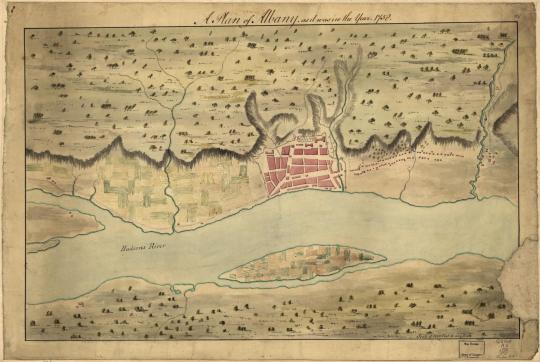
A plan of Albany, as it was in the year 1758.
22 notes
·
View notes
Text

THE DEERSLAYER, or, THE FIRST WAR-PATH: A Tale by James Fenimore Cooper (1789-1851). (New York: Appleton, 1883). Illustrated by Felix Octavius Carr Darley.
Part of a set of Cooper’s Novels.
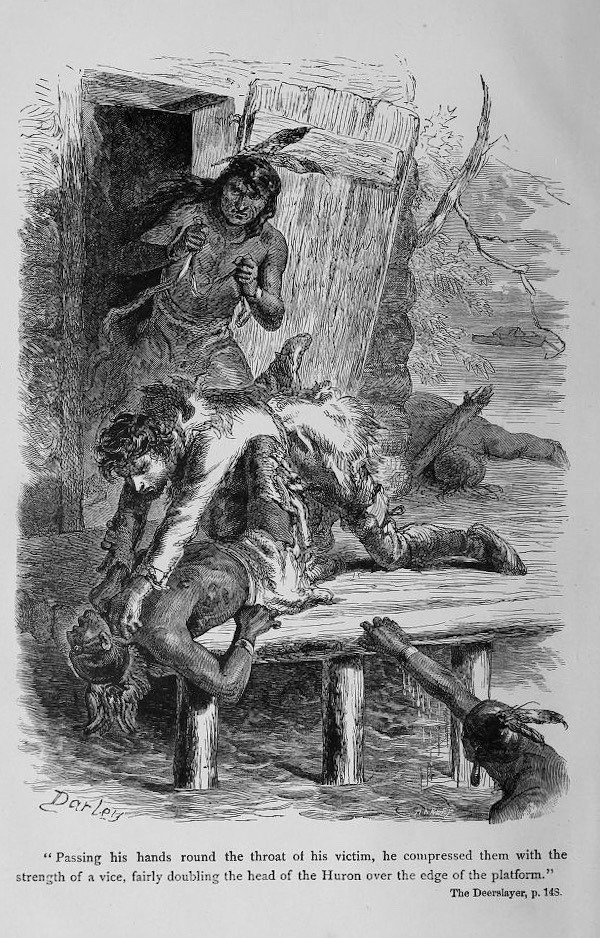
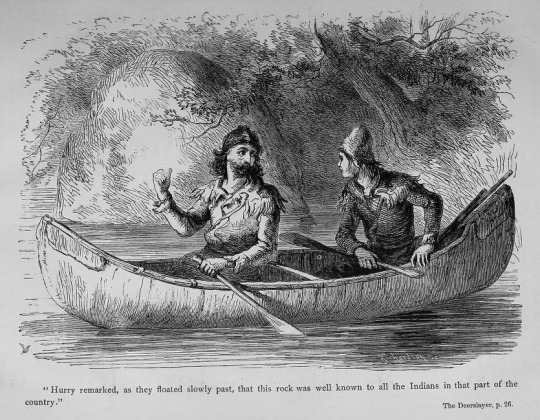
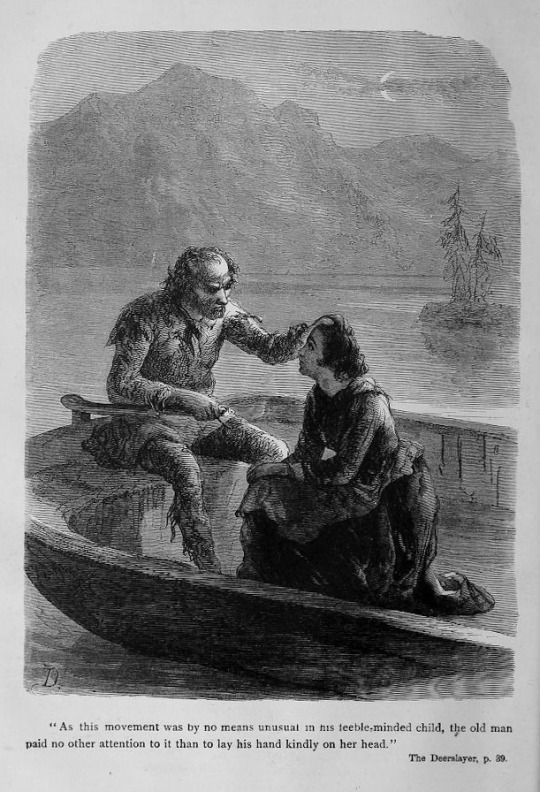
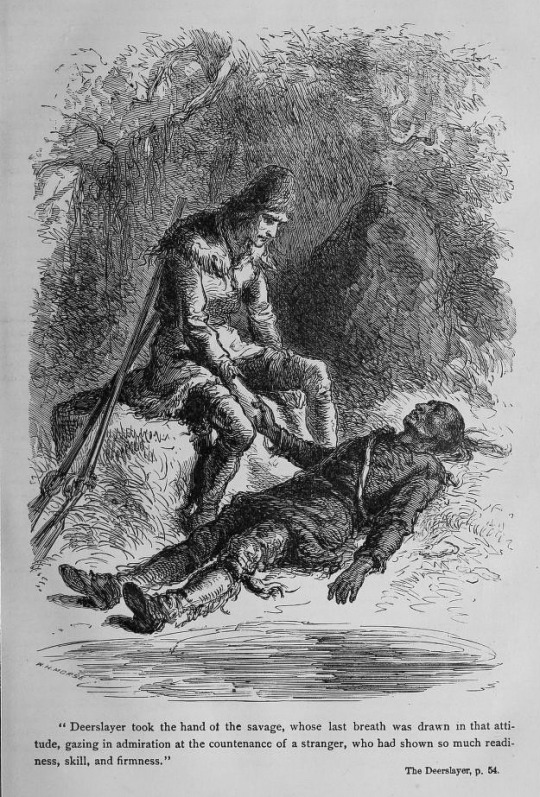
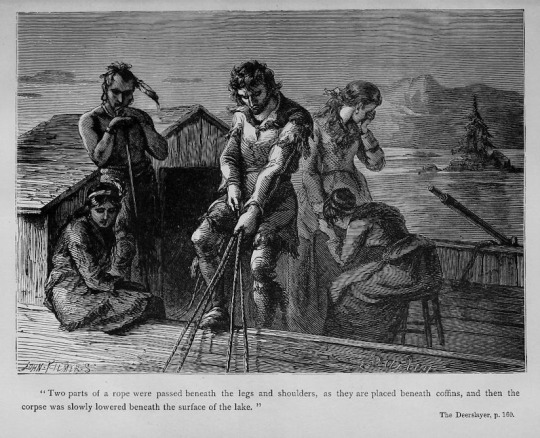
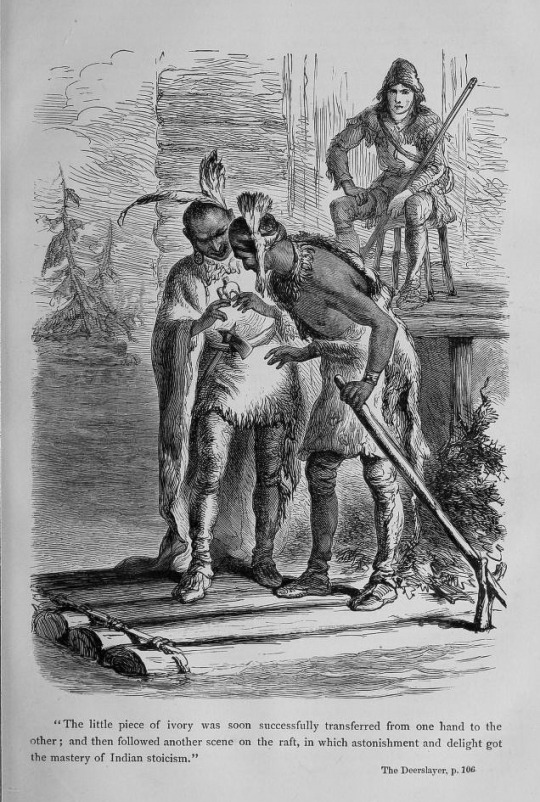
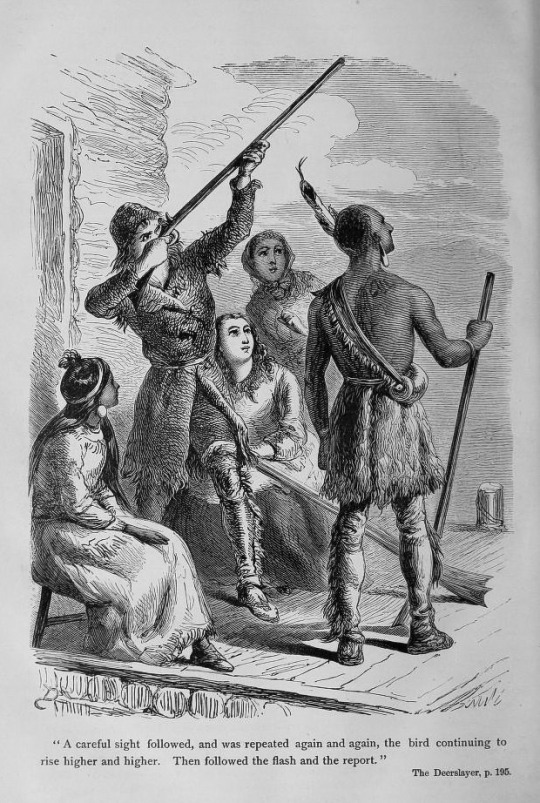
source [another edition, illos are here]
#beautiful books#book blog#books books books#book cover#books#vintage books#illustrated book#book design#james fenimore cooper#the deerslayer#felix octavius carr darley#french and indian war#natty bumpo
16 notes
·
View notes
Text
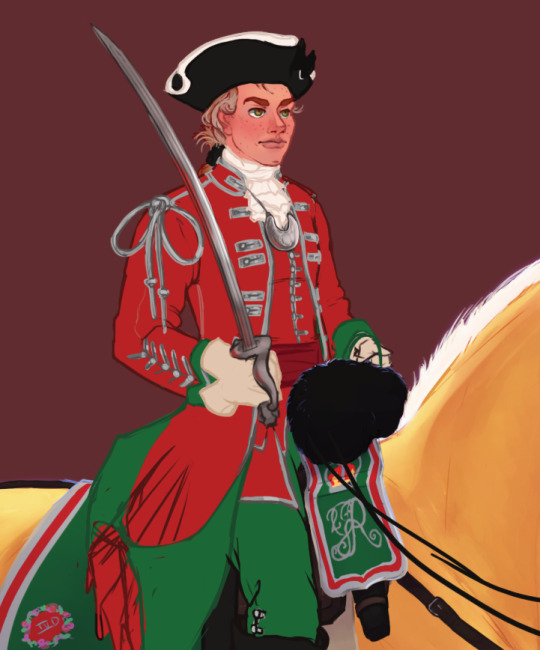
way to land a Manic Pixie Dream Dragoon, Lady Phillips
#liberty's kids#my art#work in progress#18th century#french and Indian war#seven year's war#sir phillips#major phillips#major phillips is a dragoon because I say so headcanon#why is a random dudebro from the 4th dragoons in fucking North America in 1755? shhh don't worry about it#I've finally settled on a unit now#I'm turned on by my own art oh no
19 notes
·
View notes
Text
Washington’s 1753 Winter
When it came to winter weather, the beloved General did not have the best of luck. The winters in Morristown and Valley Forge were not kind to Washington or his army as historians have famously reported. The winter of 1799 is also arguably what killed him. Of course, not every winter was completely awful with the Delaware Crossing in 1776 being very successful for Washington. However, did you know that the Delaware was not Washington’s only river crossing? That is what I am going to talk about today.
In 1753, tensions between the French and British armies were rapidly rising about who would control the Ohio Valley Territory. George Washington, then 21, was selected by the British army to carry out the diplomatic mission of ordering the French army to vacate the Ohio Valley. On December 11th 1753, Washington and his traveling companion Christopher Gist would deliver the demand to the French commander Jacques Le Gardeur, who politely refused, forcing Washington and Gist to quickly start the journey a second time, back through the wintery wilderness and their home of Virginia.
It was 18 days later, on December 29th 1753 that the two men reached the Allegheny River, which like the Delaware River would be 23 years later, was filled with large chunks of floating ice. The two men had originally assumed the river would be frozen over to the point where they would be able to walk across, and were therefore ill prepared for the crossing, forcing them to build a wooden raft and paddle across.
About halfway across the river, George Washington was tossed into the river when their raft crashed into a large ice pack on the river. Washington was nearly hypothermic due to the icy waters, and had Gist not been there to assist in pulling George from the water, it is possible that the mixture of woolen clothing dragging the man, and hypothermia impacting his ability to move properly Washington would have drowned in the Allegheny River at just age 21.
Due to the struggle, the two men were too exhausted to free themselves from the ice pack, making it impossible to reach the opposite shore or return the way they had come. Luckily, they were able to wade through the freezing water and stay a night (though miserable) on an island. By the next morning, the river had luckily frozen over allowing Washington and Gist to successfully return to Virginia, where Washington would go on to become the man we all know, while Gist who remained a friend of Washington’s went on to hold successful commands during the French and Indian War died of Smallpox in 1759.
One final interesting thing that can be observed about Washington’s 1753 trip across the Allegheny River is that it overlaps quite heavily with the Turn: Washington’s Spies scene, which shows Benjamin Tallmadge taking a plunge into the Delaware River during the 1776 crossing, leaving one to wonder if his experience may have been based off of Washington’s real world experience.

Source: “Washington's Winters.” George Washington's Mount Vernon, https://www.mountvernon.org/george-washington/so-hard-a-winter/.
22 notes
·
View notes
Text
And now that you've answered that, why not sit back and enjoy a brief history of the American Revolution:
First, the Seven Years War happens. It's mostly thought of as having been fought in Europe, but a campaign (not that kind) is also fought in North America. It is called "The French and Indian War" by the locals.
Britain wins the war against France, and subsequently gets the rights to all land east of the Mississippi river.
Colonialists start moving onto native land, probably with a lot of aggression and arrogance. This is ok so far as Britain is concerned, because they assume that the colonialists can play nice with the natives.
That is not the case. As such, the natives push back against them. 500+ colonialists die during this conflict.
Britain realizes that the colonialists CAN'T play nice and forbids them from going west of Appalachian mountains. Troops are sent to enforce this. Taxes are raised to support the troops, levied mostly on the colonies because they're the reason this mess exists at all.
Wealthy Land / Business Owners get frustrated by Britain imposing its will on the colonies and disallowing them from spreading West. Sure, taxes are bad, but it probably wasn't the little folks paying the lion's share of them, except insofar as the fees associated with them are concerned, but you pay sales taxes, so you know that heavy toll already.
Unhappy working class colonialists don't like paying those extra fees, like any USAmerican doesn't like, but this dislike is further stoked into unhappiness via propaganda until war is inevitable.
France, convinced by wealthy colonialists, backs to revolution as a "fuck you" to Britain ("We can't have land in the Americas? Fine. You don't get your precious colonies, either")
America is born! If you're a wealthy white man you're free to do whatever! Otherwise you can fuck off.
Imperialist conquest of the continent begins in earnest ("but really it's just our Manifest Destiny to control the whole continent so it's alright").
+++++
Ultimately, if they don't benefit the wealthy, any establishment of rights in USAmerica regarding a disenfranchised group only happens after massive civil disruption.
Said rights are never seen as good by the establishment, only as the necessary price for keeping/restoring the peace.
For Example:
The north fought the civil war to keep the south in the union. The south fought the civil war to keep their slaves.
If Lincoln hadn't been killed and his VP hadn't bungled things as much as he did, there would be no amendment regarding slavery, it would be a purely legislative matter, not a constitutional one.
This means that, if Lincoln lived, we'd need to worry about republicans overturning anti-slavery laws too, in addition to everything else.
#american revolution#America#usa#founding fathers#Tax the rich#eat the fucking rich#eat the rich#manifest destiny#the big lie#imperialism#colonialism#westward expansion#north america#seven years war#french and indian war#thirteen colonies#original colonies#taylor polls
3 notes
·
View notes
Text
Day of Commemoration for the Acadian Expulsion
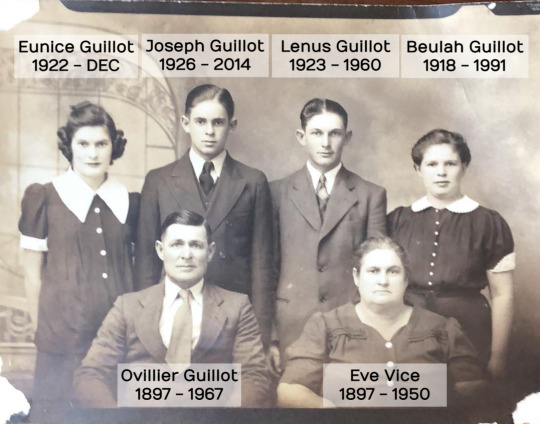
Image Description: A black and white portrait of the Ovillier Guillot and Eve Vice family, circa the early-to-mid 1900s. Top (children), left to right: Eunice Guillot 1922-Dec; Joseph Guillot 1926-2014; Lenus Guillot 1923-1960; Beulah Guillot 1918-1991. Bottom (parents), left to right: Ovillier Guillot 1897-1967; Eve Vice 1897-1950.
The two daughters wear similar dark, button-down dresses with white doll collars. The mother wears a dark, button-down open-collar blouse or dress. The two sons and the father wear white dress shirts covered by fastened suit jackets complete with ties.
Image by [[TBD]].
— — — — — — — — —
Pictured above is my 3rd great-uncle Ovillier Guillot and his family. He is the 4th great-grandson of Jean Baptiste Guillot.
Today is the Day of Commemoration for the Acadian Expulsion.
While I have quite a few direct ancestors who lived in Nova Scotia and ended up in France at the time of the expulsion, there's only one family unit that I have been able to confirm was expelled.
That was the family of my 8th great-grandfather Jean Baptiste Guillot, born in Acadia in 1720 with his body given to the Atlantic Ocean in 1758. His family was expelled from Cobequid, Acadia, Nova Scotia to France during the brutal "Great Expulsion" by the British, who wanted to squelch any potential threats from the Acadians and the Mi'kmaq during the French and Indian War.
His son (my 7th great-grandfather) Charles Olivier Miquel Guillot was only 13 in 1758 when they had to take the long, arduous 75-day journey to France. His father Jean, along with 4 of his brothers, never made it off of the ship.
Charles grew up in France where he married and had 3 children of his own. They left France in 1785 to board one of the seven ships paid for by Spain, Le Saint-Rémi, to take them to Lafourche Parish, Louisiana.
Many members of the Wabanaki Confederacy (I believe predominately it was the Mi'kmaq militia), in addition to other affiliated Indigenous tribes and Acadians, who rallied a resistance were slaughtered or expelled. They refused to swear loyalty to the British crown and surrender to British colonists, refused to convert from Catholicism to Protestantism, and refused to allow themselves to be displaced without a fight. Numerous battles took place to stop the deportation with wins and losses across the board.
While no one has one lineage, I was raised as a proud Cajun despite having often felt ashamed of being Cajun for various reasons (like my accent). I even tried my hardest over twelve years to banish anything that could link me to my roots, not knowing the history behind a part of my ethnicity and culture.
Digging into my ancestry has been a wild ride, and there were many things found within my lineages that were not honorable in any way, but this chunk of my history? This has made me proud to be Cajun again.
I wish I had respected it more when I was still able to be immersed in it. I wish I had asked my pawpaw to tell me more stories. I wish I had kept up with Cajun French (AKA Louisiana French). I wish I hadn't let my cultural heritage fall through my fingers.
Many blessings to those who fought and lost their lives against the British colonists in an attempt to secure the freedom of not only themselves but of future generations to come.
[Disclaimer: I am still only beginning to educate myself about this event and am utilizing my current understanding of how events unfolded and who was involved. I apologize in advance for any misconceptions or misinformation regarding the historical accuracy of my comments.]
#Nova Scotia#France#Canada#Acadia#Acadian#Acadian Expulsion#Day of Commemoration#History#Family History#Family#Genealogy#Genealogy Blog#Twisting Tree#Twisting Tree Ancestry#Ancestry#Ancestry Blog#Cajun#Le Saint Remi#Day of Commemoration for the Acadian Expulsion#Guillot#Guillot Family#Louisiana#Louisiane#Acadie à la Louisiane#Acadie#Mi'kmaq#Mi'kmaw#French and Indian War#Pawpaw#Cajun French
7 notes
·
View notes
Text

Let's start 2024 the right way, with some highlander art by Daniel Irwin. https://artstation.com/artwork/Qre9LL
#history#british army#military history#18th century#redcoat#seven years war#7 years war#french and indian war#highlander#highlands#kilt#scotland#scottish#scots
140 notes
·
View notes
Text
In the 1750s, tensions between the British, the French, and Indigenous peoples over control of the Ohio Country in North America lead to the outbreak of a global war.
Full transcript
The French Canadian officer lay wounded in the Pennsylvania glen that in time would bear his name. The ground was still wet – it had rained all through the night – and his men had barely begun to cook their breakfast when the shots rang out. Perhaps he could still smell smoke from their campfires. Surely, he could smell gunpowder. Ensign Joseph Coulon de Jumonville was thirty-five years old on this, his last morning. It was May 28, 1754. Five days earlier, Jumonville had left Fort Duquesne, built at the Forks of the Ohio River near what is now Pittsburgh, and headed southeast with 35 mostly French-Canadian men. He carried a message for the commander of a Virginia regiment that he knew was nearby. The British and their colonists were to leave the area immediately, the message read. They were intruders in the colony of New France, and these lands belonged to His Most Christian Majesty, Louis XV.
#american history#north american history#Tanaghrisson#New France#Seven Years War#French and Indian War#Mingo
3 notes
·
View notes
Text
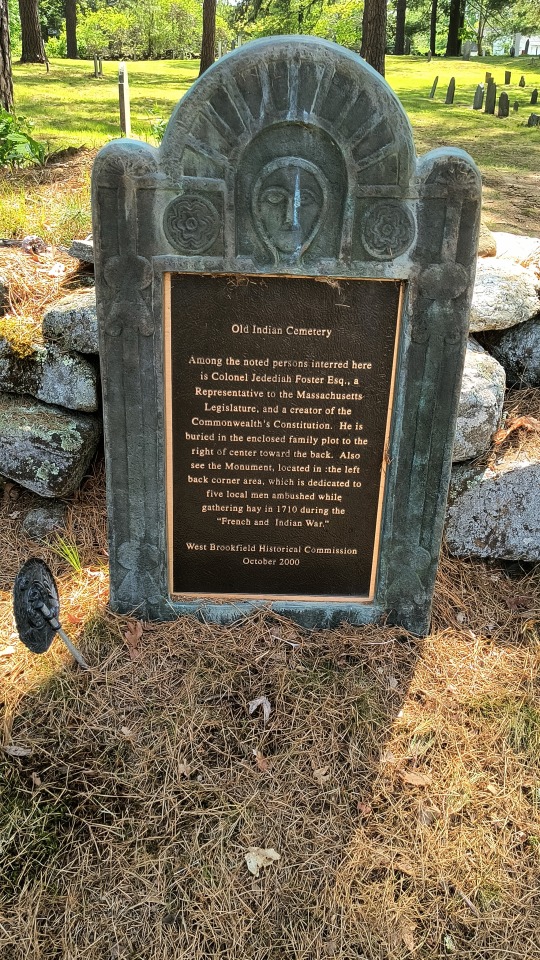
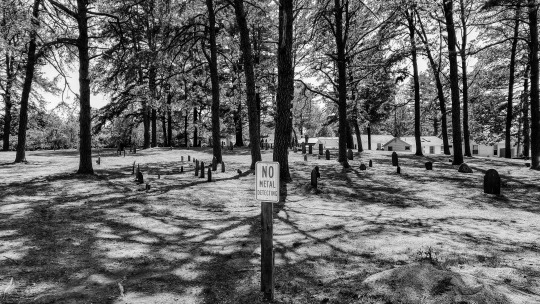
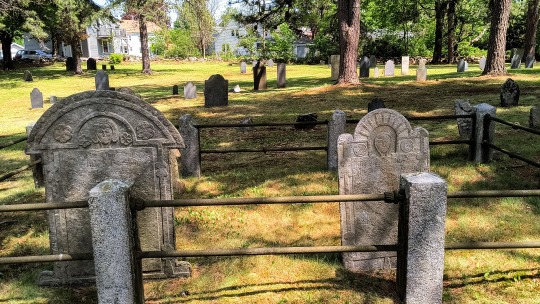
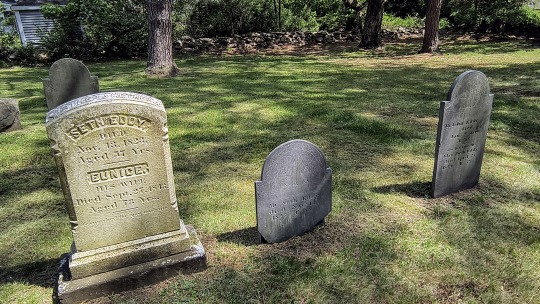
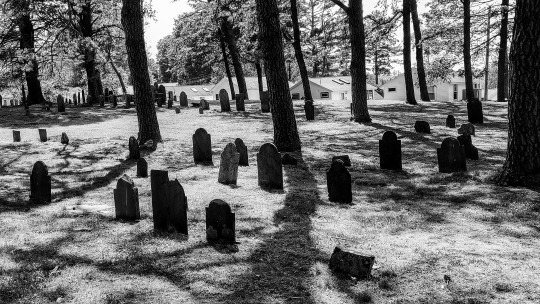



Old Indian Cemetery. Located in West Brookfield MA it was founded way back in 1710. Here's a brief sketch of it's history from Wikipedia:
"The Old Indian Cemetery or "Old Cemetery" is a historic cemetery at 50 Cottage Street in West Brookfield, Massachusetts.
The cemetery was established in 1710 and was an active burial ground until 1849. The cemetery "is the resting place of 16 French and Indian War soldiers, 11 Revolutionary War soldiers, and 6 men who were killed in 1710 by Indians and became known as the Haymakers. It is also the resting place for Jedediah Foster, his wife and daughter, and Diederick Leertouwer."[2] The site was added to the National Register of Historic Places in 2006."
There's some haunting gravestones decorated with beautiful, primitive funerary art to be found at this old burial ground. I really enjoyed my 1st visit to this cemetery.
5/16/23
8 notes
·
View notes
